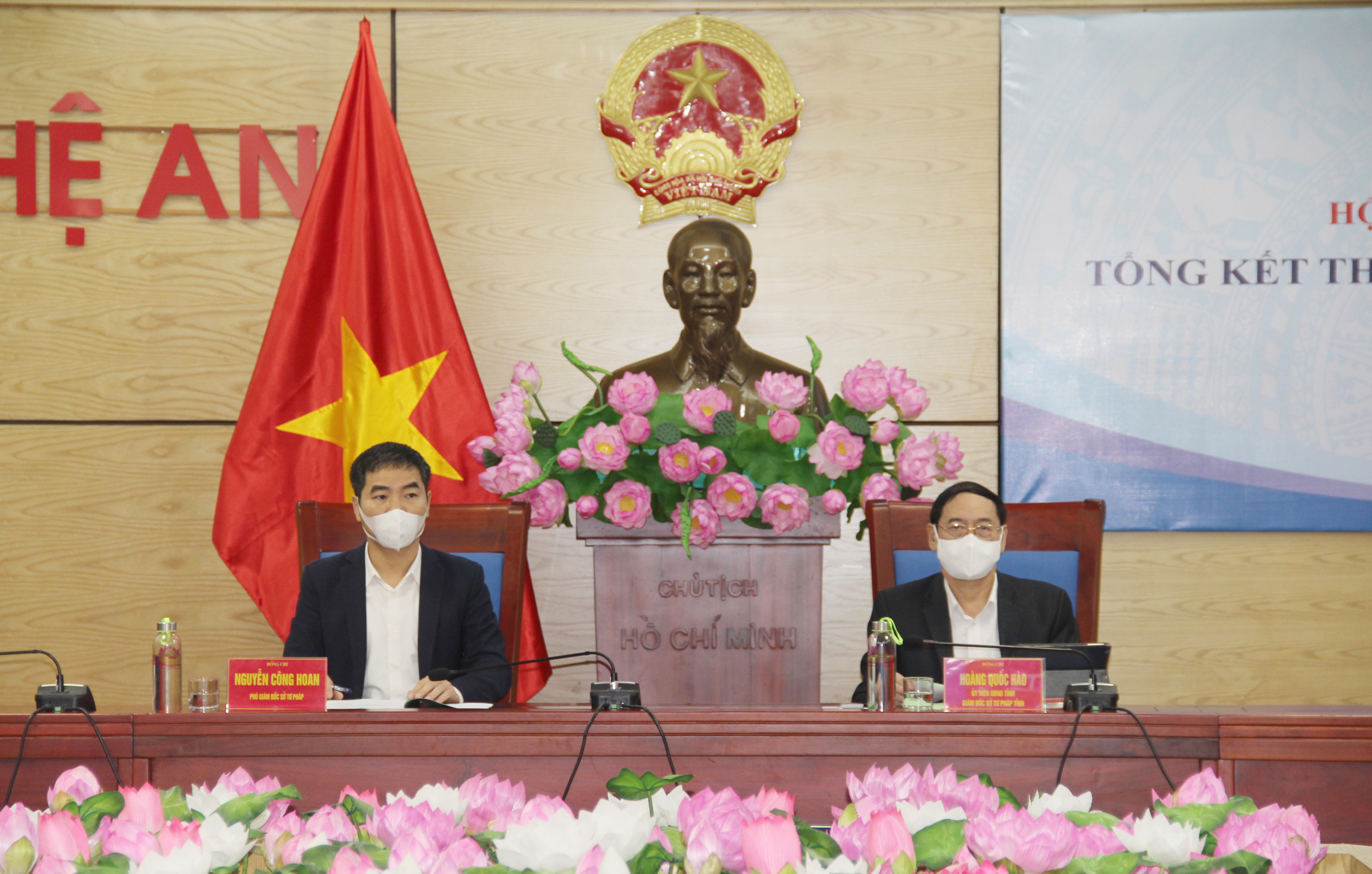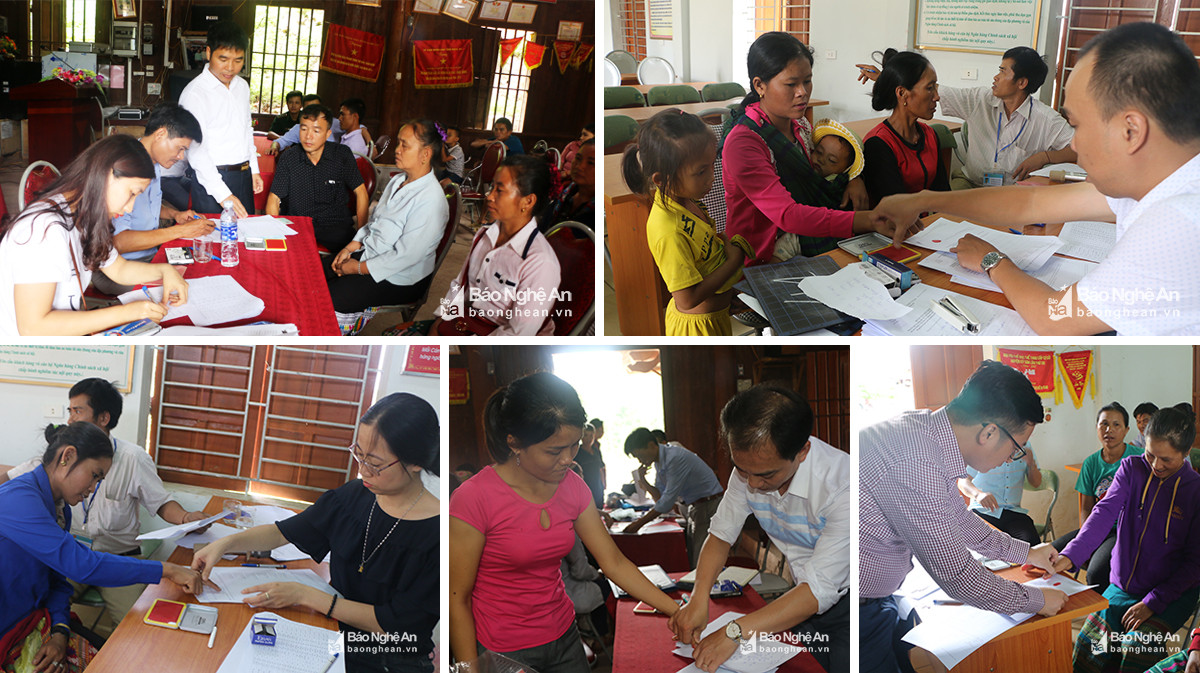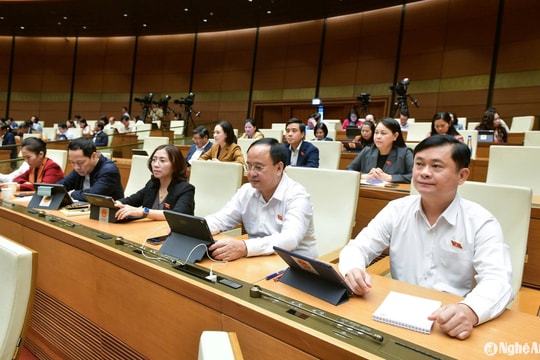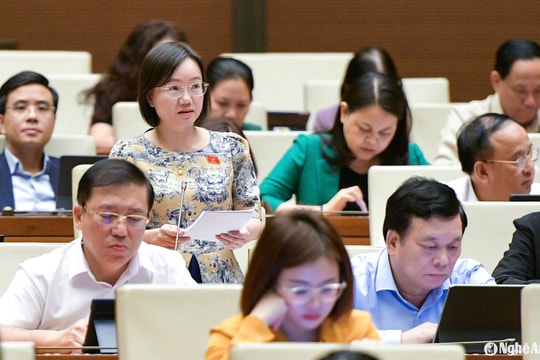Proposal to maintain the mandatory notarization regulation for real estate transactions
(Baonghean.vn) - The Ministry of Justice proposed to amend and supplement the contents of the Notary Law such as maintaining the mandatory notarization regulations for transactions related to real estate; continuing to socialize notarization activities; strengthening inspection and examination to correct violations in notarization activities...
On the morning of January 14, the Ministry of Justice held a conference to summarize 5 years of implementing the Notary Law. Chairing the conference at the Hanoi bridge point were Deputy Minister of Justice Phan Chi Hieu and Director of the Department of Judicial Assistance Le Xuan Hong. Chairing the conference at the Nghe An bridge point were leaders of the Department of Justice: Hoang Quoc Hao - Director; Nguyen Cong Hoan - Deputy Director.
Identify limitations and shortcomings
Notary Law(amended) was passed by the 13th National Assembly on June 20, 2014, effective from January 1, 2015. After more than 5 years of implementation, the Notary Law continues to actively contribute to the implementation of the policy of socializing notary activities; ensuring legal safety for contracts, transactions, and the value of using translations, contributing to creating a favorable and trustworthy legal environment for investment, business, and trade activities and making an important contribution to the process of administrative reform and judicial reform.
 |
| The comrades chaired the conference at Nghe An bridge point. Photo: Hoai Thu |
However, in the process of implementation, a number of new issues have arisen that have not been regulated by the Notary Law. Some provisions of the Law have revealed limitations and inadequacies that need to be summarized and comprehensively evaluated to propose and recommend to competent authorities for consideration. Therefore, the conference was held not only to evaluate the implementation results but also to identify the shortcomings, limitations, causes, and discuss and propose amendments and supplements to request competent authorities to amend them to suit the reality.
Through discussion and evaluation, the conference identified 6 existing causes that need to be amended and supplemented: the number of notaries is increasing rapidly but the quality of the notary team and those assigned to perform notary duties is uneven, mainly concentrated in big cities. The quality of notary practice still has shortcomings, not really meeting the requirements.
A number of notaries have not complied with professional ethics, and there are also cases of notaries intentionally violating the procedures and order of notarization as prescribed by law. Unhealthy competition and pursuit of profit still occur, affecting the reputation of the notary profession in society. The application of information technology in notarization activities is not yet commensurate with the development of the industry.notary.
The distinction between notarization and certification does not accurately reflect the nature of the activity. The scope of mandatory notarization transactions is still too narrow, posing great risks to people when entering into transactions that are not notarized. State management of notarization is not really thorough and thorough; at times and in some places, it is still confusing and lax.
As of December 31, 2019, the country had: 2,782 notaries (including 383 notaries of Notary Offices and 2,399 notaries of Notary Offices). Compared to the time of implementing the Notary Law in 2006, there was an increase of 2,157 people. There were 1,151 notary practice organizations (TCHNCC), including 120 notary offices and 1,031 notary offices (an increase of 526 organizations).
Proposed amendments and additions to many contents
Delegates attending the conference also identified four causes leading to limitations, and discussed and proposed directions and solutions to improve the Notary Law.
 |
| Officials from the Department of Civil Status, Nationality and Authentication (Ministry of Justice) and the Nghe An Department of Justice guide citizens through procedures for naturalization. Photo: KL |
Accordingly, it is necessary to strengthen the coordination of competent authorities to proactively guide and remove obstacles and difficulties in implementing the Notary Law and related regulations such as: Civil Code, Land Law, Housing Law, Road Traffic Law, Marriage and Family Law... to create a synchronous legal basis and a basis for unified application in notary activities.
Strengthen inspection and examination to rectify violations and negative manifestations in notary activities. Continue to consolidate, improve and enhance the organization and operation of social and professional organizations of notaries. Continue to promote the policy of socialization of notary; develop a nationwide network of TCHNCC in association with residential areas.
Building highly professional TCHNCCs to meet the increasing demands of society for the quality of notary services. Building a national database on notarization that allows interconnection and connection with a number of important national databases related to notarization activities, such as: citizen database, household registration database, land information database.
The conference also agreed on specific recommendations for relevant levels and sectors such as: Proposing to include the Notary Law project (amended) in the Law and Ordinance Development Program for 2022 - 2024 with a number of major contents that need to be studied for amendment and supplementation. Proposing to amend relevant provisions of the Civil Code, Land Law, Housing Law, Road Traffic Law and other relevant legal documents, creating a synchronous and unified legal basis for innovation and development of the notary profession; maintaining the mandatory notarization of contracts and transactions related to real estate in the Land Law (amended) as stipulated inLand Lawcurrent.
It is recommended to specify more clearly the effective time of notarization and registration to avoid different interpretations in implementation, ensure legal safety for contracts and transactions, prevent risks of disputes, and ensure social order and safety.
For the People's Committees of provinces and centrally run cities, it is recommended to continue to disseminate more deeply and widely the role, position and nature of notary activities so that individuals and organizations can better understand the importance of notary activities for socio-economic development. From there, direct the Department of Justice, relevant Departments, branches and sectors to advise the People's Committees at the provincial level in developing notary activities in accordance with the general development situation of notary activities nationwide.
During the 5 years of implementing the Notary Law, TCHNCCs nationwide have notarized more than 27 million cases; certified signatures on papers and documents, and certified copies from originals for nearly 52 million cases; the total notary fees collected were about 8.5 trillion VND; the authentication fees collected were nearly 346 billion VND; the total notary remuneration collected was nearly 1.4 trillion VND; the total amount of tax payments and payments to the state budget was about 1.7 trillion VND.
According to reports from localities, as of December 31, 2019, most notarized documents are legally safe. The number of cases requiring compensation for damages to notarization requesters is quite low. The total amount of compensation for damages to notarization requesters is about more than 12 billion VND. Many localities have no cases requiring compensation for damages to notarization requesters.







.jpg)

